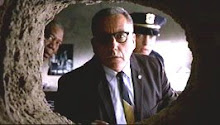 The start of Chapter 16, "A New Birth of Freedom," from David Herbert Donald's Pulitzer Prize-winning biography, "Lincoln" --
The start of Chapter 16, "A New Birth of Freedom," from David Herbert Donald's Pulitzer Prize-winning biography, "Lincoln" --"The weeks after the battle of Chancellorsville were among the most depressing of Lincoln's presidency. Everything went wrong -- at Charleston, at Vicksburg, in eastern Tennessee, and, especially, in northern Virginia. Failure of Union arms led to renewed protests against the war and to demands for peace negotiations. Controversy over the arrest of Vallandigham and the suppression of civil liberties mounted. So did complaints about the incompetence of Lincoln's administration. At one end of the political spectrum a Democratic politician addressing a huge peace rally in New York City characterized the President as a donkey in a china shop and urged, 'You must get rid of him or he will smash the crockery.'
"At the other end Missouri Radical Republicans attacked Lincoln for his compromising, indecisive course and for refusing to put abolitionist generals like Fremont and Butler in command of the armies. Even more disturbing were reports that some army officers, like Major Charles J. Whiting of the Second United States Cavalry, were denouncing this 'damned abolition nigger war,' claiming that 'the President had exceeded his authority in proclaiming the niggers free, and in suspending the writ of Habeus Corpus, and that Republicans would not have the war cease, if they could ... They were all making money out of it, and consequently it was for their interest to prolong the war.'
"Grimly Lincoln informed his critics that it might be 'a misfortune for the nation that he was elected President. But having been elected by the people, he meant to be President, and to perform his duty according to his best understanding (emphasis in the original), if he had to die for it.' But the downward spiral of events during the past six months finally convinced the reluctant President that he had to exert more active leadership, both in the conduct of military operations and the shaping of public opinion. Firmly taking the lead, he recovered much of the ground he had lost during the previous months of indecision and inaction."





No comments:
Post a Comment